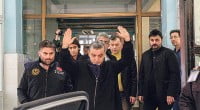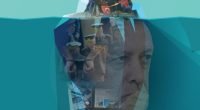Erdoğan’s abstract enemies: parallel organization and superior mind

Date posted: January 5, 2015
Totalitarian regimes rely on their ability to manufacture enemies. In his New Year message, President Recep Tayyip Erdoğan referred to a host of “external enemies” and “traitors.” The ruling party characterizes these traitors as the “parallel organization” and “superior mind.” The phrases “parallel state” and “Pennsylvania organization” are used synonymously with the “parallel organization” as well. These phrases offer a comforting luxury. As they are abstract characterizations and no one takes any offense from them, they give Erdoğan and the media outlets at his disposal the opportunity to shadow box.
These concepts are extremely abstract. There is no judicial investigation in which these concepts are used. These vague and abstract concepts are used solely with the intention of spreading pro-government propaganda and intimidating the opposition. This propaganda has grown utterly ridiculous at times. Recently, the pro-government Sabah daily accused the parallel organization of causing meat prices to rise. The news report that claimed that the concept of the “parallel organization” was added to the Red Book — a national security document in which major threats against the nation are listed — during the last meeting of the National Security Council (MGK) had propagated another myth conjured up based on this abstract accusation.
The Sabah and Habertürk dailies reported it with conflicting information that apparently came from the same source. This indicates that they are being made a tool in the ruling party’s propaganda.
The second term used in conjunction with the phrase “parallel organization” is “superior mind,” which refers to a more powerful and more inclusive enemy. Anyone who opposes to the ruling Justice and Development Party (AK Party) has a role in this superior mind. Thus, Erdoğan places Israel, which he refers to as “our southern neighbor,” as well as Turkey’s leading businessmen into this category.
The trials for Ergenekon — a clandestine organization nested within the state trying to overthrow or manipulate the democratically elected government– and Balyoz (Sledgehammer) — a suspected coup plot believed to have been devised in 2003 with the aim of unseating the AK Party government through violent acts — was the work of these enemies. In this way, Erdoğan has found new allies. And he can ward off the graft and bribery investigations that went public on Dec. 17 and 25, 2013 as the parallel organization’s attempted coup against his government. He believes he can be exonerated with this defense.
Like the Soviet propaganda of the Cold War era, these abstract, vague and obscure enemies are used to cover up the ruling party’s corrupt practices and errors. A comparison between what Erdoğan said about the Ergenekon and Balyoz trials in the past and what he is currently saying about them reveals who has changed and to what extent and who is trying to ally with whom. The totalitarian state in George Orwell’s dystopian novel, “1984,” which uses the propaganda machinery to attack old friends and befriend old enemies, is alive in Turkey.
Given this picture, one can understand why the ruling party is desperately trying to silence the Zaman daily and the Samanyolu TV network, which can neutralize the state-backed propaganda machine effectively. The only force that can render ineffective the baseless or unfounded propaganda of the totalitarian state is the free press. Those who have been making the media outlets at their disposal run all sorts of news reports about the so-called parallel organization for about one year were ultimately only able to find a script of a soap opera and two news reports to prove the existence of this organization. The attacks on the free press have demonstrated that the “parallel organization” propaganda is actually unfounded.
The path Erdoğan is walking on is getting narrower. Erdoğan represents four errors in the four critical issues for Turkey: a preference for the Shanghai Cooperation Organization (SCO) over the European Union, the parasitic contracting sector that clings like a leech to the country’s economy, the tactical distractions regarding the Kurdish issue and the increased unlawfulness that seeks to cover up corruption.
For veiling such gross errors, he needs to secure a strong media backing and silence critical media. Furthermore, he needs enemies. The abstract and fuzzy enemies like the parallel organization and the superior mind can no longer fit to this role.
Source: Today's Zaman , January 04, 2015
Tags: Defamation of Hizmet | Freedoms | Hizmet and politics | Turkey |
























